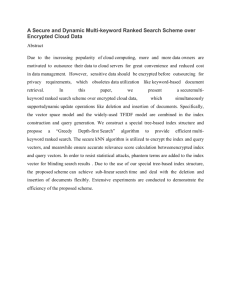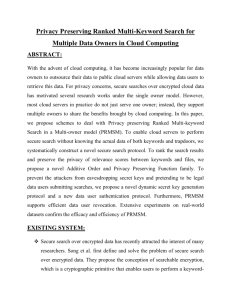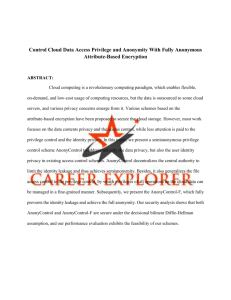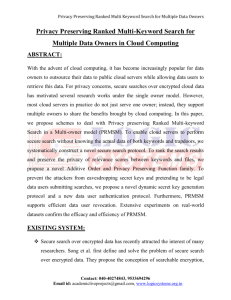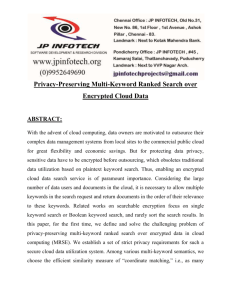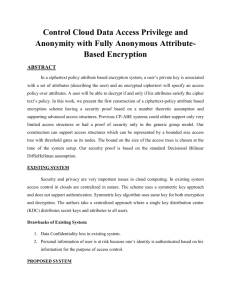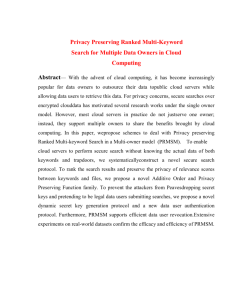- Krest Technology
advertisement
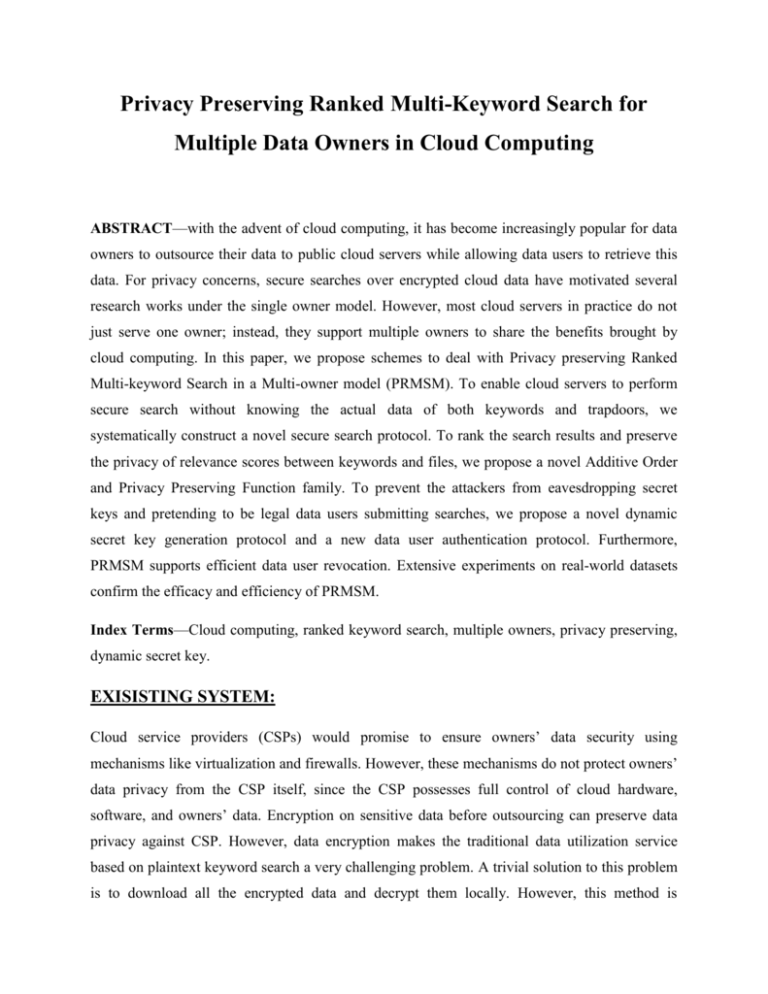
Privacy Preserving Ranked Multi-Keyword Search for Multiple Data Owners in Cloud Computing ABSTRACT—with the advent of cloud computing, it has become increasingly popular for data owners to outsource their data to public cloud servers while allowing data users to retrieve this data. For privacy concerns, secure searches over encrypted cloud data have motivated several research works under the single owner model. However, most cloud servers in practice do not just serve one owner; instead, they support multiple owners to share the benefits brought by cloud computing. In this paper, we propose schemes to deal with Privacy preserving Ranked Multi-keyword Search in a Multi-owner model (PRMSM). To enable cloud servers to perform secure search without knowing the actual data of both keywords and trapdoors, we systematically construct a novel secure search protocol. To rank the search results and preserve the privacy of relevance scores between keywords and files, we propose a novel Additive Order and Privacy Preserving Function family. To prevent the attackers from eavesdropping secret keys and pretending to be legal data users submitting searches, we propose a novel dynamic secret key generation protocol and a new data user authentication protocol. Furthermore, PRMSM supports efficient data user revocation. Extensive experiments on real-world datasets confirm the efficacy and efficiency of PRMSM. Index Terms—Cloud computing, ranked keyword search, multiple owners, privacy preserving, dynamic secret key. EXISISTING SYSTEM: Cloud service providers (CSPs) would promise to ensure owners’ data security using mechanisms like virtualization and firewalls. However, these mechanisms do not protect owners’ data privacy from the CSP itself, since the CSP possesses full control of cloud hardware, software, and owners’ data. Encryption on sensitive data before outsourcing can preserve data privacy against CSP. However, data encryption makes the traditional data utilization service based on plaintext keyword search a very challenging problem. A trivial solution to this problem is to download all the encrypted data and decrypt them locally. However, this method is obviously impractical because it will cause a huge amount of communication overhead. Therefore, developing a secure search service over encrypted cloud data is of paramount importance. Disadvantages: 1. Single keyword search without ranking 2. Boolean keyword search without ranking 3. Single-keyword search with ranking 4. Do not get relevant data PROPOSED SYSTEM: We propose PRMSM, a privacy preserving ranked multi-keyword search protocol in a multiowner cloud model. To enable cloud servers to perform secure search without knowing the actual value of both keywords and trapdoors, we systematically construct a novel secure search protocol. As a result, different data owners use different keys to encrypt their files and keywords. Authenticated data users can issue a query without knowing secret keys of these different data owners. To rank the search results and preserve the privacy of relevance scores between keywords and files Advantages: prevents attackers from eavesdropping secret keys and pretending to be illegal data users performing searches, but also enables data user authentication and revocation. allows data owners to encrypt keywords with self-chosen keys and allows authenticated data users to query without knowing these keys. Allows data owners to protect the privacy of relevance scores using different functions according to their preference, while still permitting the cloud server to rank the data files accurately. ARCHITECTURE: MODULES: 1. Data owner scalability 2. Data user revocation 3. Security Goals MODULE DESCRIPTION: Data owner scalability: Data owners to enter this system without affecting other data owners or data users, i.e., the scheme should support data owner scalability in a plug-and-play model. Data user revocation: Data users can perform correct searches. Moreover, once a data user is revoked, he can no longer perform correct searches over the encrypted cloud data. Security Goals: The proposed scheme should achieve the following security goals: 1) Keyword Semantic Security: We will prove that PRMSM achieves semantic security against the chosen keyword attack. 2) Keyword secrecy: Since the adversary A can know whether an encrypted keyword matches a trapdoor, we use the weaker security goal (i.e., secrecy), that is, we should ensure that the probability for the adversary A to infer the actual value of a keyword is negligibly more than randomly guessing. 3) Relevance score secrecy: We should ensure that the cloud server cannot infer the actual value of the encoded relevance scores. SYSTEM REQUIREMENTS: HARDWARE REQUIREMENTS: System : Pentium IV 2.4 GHz. Hard Disk : 40 GB. Floppy Drive : 1.44 Mb. Monitor : 15 VGA Colour. Mouse : Logitech. Ram : 512 Mb. Operating system : Windows XP/7. Coding Language : JAVA SOFTWARE REQUIREMENTS:
